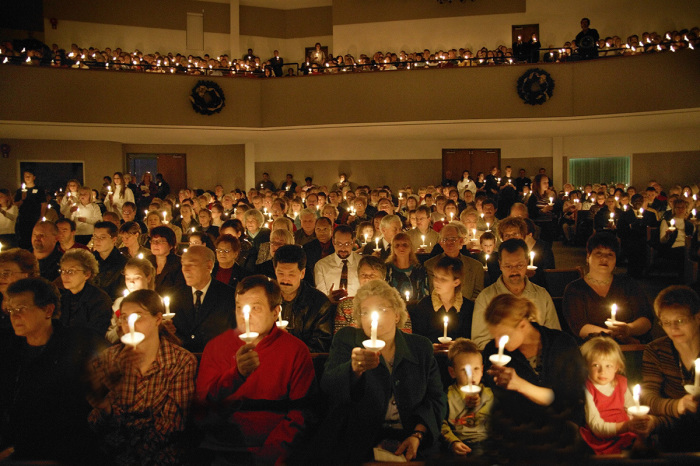Americans split on plans for attending church this Christmas: survey
Less than 40% of non-Evangelicals report going to services

Adults in the United States are divided on whether they'll be attending church this Christmas season, a recent study from Lifeway Research suggests.
According to the survey of over 1,200 Americans conducted in August, nearly half (47%) said they typically attend church during the holiday season, while 48% said they do not, and 5% were unsure.
"The very name 'Christmas' originates in the church's celebration of Jesus Christ's birth. In the mid-14th century, the words 'Christ's Mass' were first merged as a single term for this celebration," said Scott McConnell, executive director of Lifeway Research. "While 9 in 10 Americans do something to celebrate Christmas, less than half typically attend church at Christmastime today."
The study highlights the stark contrast between different denominations and their likelihood of attending church.
Protestants (57%), Catholics (56%) and those from other religious backgrounds (53%) are far more likely to attend church at Christmastime than the religiously unaffiliated, only 21% of whom report attending. Among religiously unaffiliated individuals, 71% say they do not usually attend church during Christmas.
One of the most significant factors influencing church attendance is the frequency with which individuals attend services. Of those who attend church more than once a week, 95% say they typically attend church at Christmas.
About 72% of respondents with Evangelical beliefs report attending church during Christmas, while only 40% of those without Evangelical beliefs said the same.
Among the 47% of respondents who typically attend church at Christmas, the majority (60%) say their motivation is to "honor Jesus."
Notably, those who attend church less frequently are more likely to cite tradition as the primary reason for attending at Christmastime. Among those who rarely attend church or only go on holidays, 22% and 27%, respectively, say they attend mainly to observe tradition, compared to just 10% of regular weekly attendees.
"While church services draw more people in the Christmas season, their prime motivation isn't unified," said McConnell. "The majority are drawn to celebrate the birth of Jesus, honoring Him as the Christ or promised Messiah. But others mostly join in because of the importance of family, their embrace of Christmas church tradition or to jump-start Christmas vibes."
The findings also suggest that many Americans who don't typically attend church at Christmas might do so if invited.
Among those who usually skip church, 56% said they would likely attend if someone they know invited them, including 17% who are very likely to go. However, 36% said they're unlikely to attend, with 24% stating they are very unlikely.
"More than one in eight Americans are convinced they would not attend a Christmas service if an acquaintance invited them," McConnell said. "However, the majority of Americans who do not typically attend church at Christmastime say they probably would if they were invited by someone they know."
Invitation effectiveness varies across religious groups. Catholics (71%), Protestants (65%) and those of other faiths (58%) are more likely to say they would attend if invited than the religiously unaffiliated (40%). The likelihood of accepting an invitation is also higher among women (61%), Hispanics (72%) and individuals with Evangelical beliefs (69%).
Older Americans, however, show less interest in attending a church service, even if invited. Among those aged 65 and older, 48% said they were unlikely to attend a service, whether or not they received an invitation.
The survey was conducted from Aug. 14-30 using a nationally pre-recruited panel. To ensure the sample accurately reflected the U.S. population, quotas and slight weights were applied to balance gender, age, region, ethnicity, education, religion and Evangelical beliefs. The survey also included an over-sample of Americans with Evangelical beliefs to allow for more reliable subgroup analysis.
The error margin for the entire sample is +3.3 percentage points.
The study's findings mirror the results of a Gallup poll in March, which found that church attendance declined across most U.S. religious groups. Three in 10 Americans said they attend religious services every week (21%) or almost every week (9%), while 11% report attending about once a month. Another 56% said they seldom (25%) or never (31%) attend religious services.





























